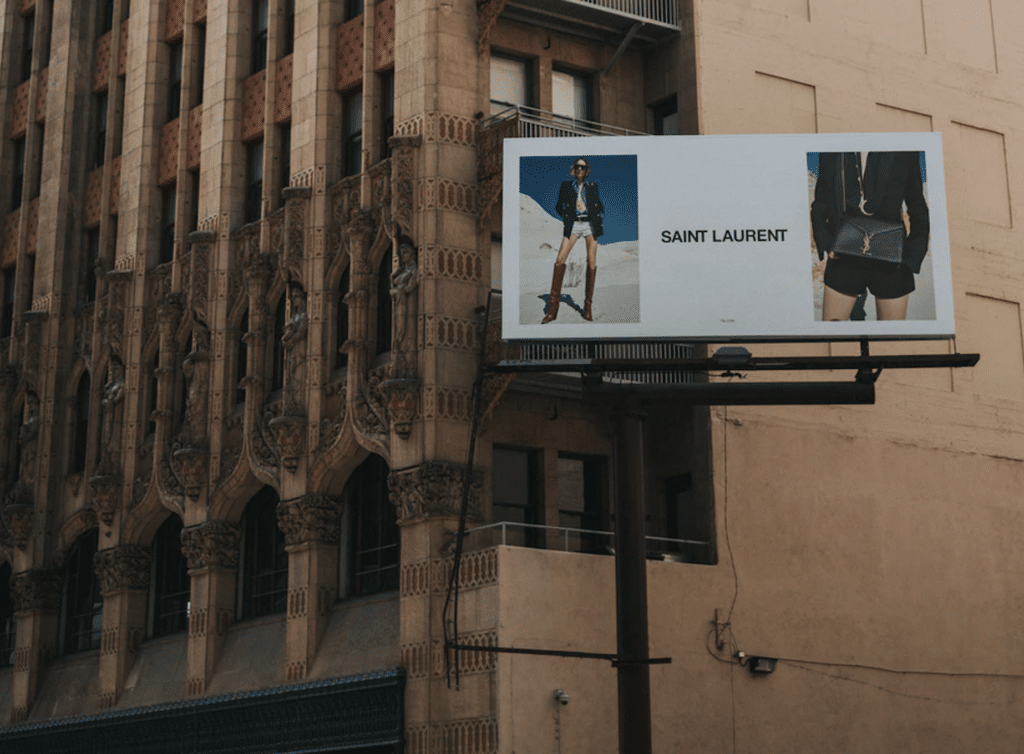Amid the latest round of current creative director musical chairs, rumors are swirling in the fashion media, that Hedi Slimane might be in the running to take the creative lead at Gucci. Newly out of the top spot at LVMH-owned Celine, Slimane’s name has been thrown in the ring for a few jobs now, including Chanel – none of which have come into fruition to date. Chances are, Slimane landing at Kering-owned Gucci may not happen either – unless, of course, the parties can shake their history of legal strife.
TFL readers will recall that Kering and Slimane are not strangers, as Slimane took the reins at Yves Saint Laurent back in 2012 in a 4-year tenure that saw him upend the branding of the company’s ready-to-wear collection and drop “Yves” from the name. While Slimane made a lot of money for Yves Saint Laurent thanks to his skinny trousers, moto jackets, and coveted footwear and handbags-infused revamp of the brand, his departure was rocky, to say the least.
In announcing Slimane’s departure in April 2016, Kering CEO François-Henri Pinault said: “What Yves Saint Laurent has achieved over the past four years” – including breaking the $1-billion-per-year revenue mark – “represents a unique chapter in the history of the house. I am very grateful to Hedi Slimane, and the whole Yves Saint Laurent team, for having set the path that the house has successfully embraced, and which will grant longevity to this legendary brand.”
Slimane v. Kering
Behind the seemingly amicable split, however, was a brewing legal battle, as just a couple months later, Slimane filed suit against Kering in a French labor court, arguing that his former employer’s parent company failed to observe the non-compete clause in his contract and to pay out the hefty sum of money that came with it. By lifting the non-compete provision at the end of Slimane’s contract in April 2016, Kering freed Slimane of the contractual limitation that would otherwise prevent him from working for a competing house for a set period of time; it also served to cut off compensation to Slimane, which would have sustained for the duration of the non-compete period. In short: Slimane alleged that Kering failed to pay him the $13 million he would have been owed had the non-compete been put into action.
Kering addressed the suit at the time, saying in a statement that the litigation centered on the non-compete provisions in Slimane’s previous contract with YSL and confirming that it lifted this clause.
In a preliminary hearing in July 2016, a French labor court determined that Kering was on the wrong side of the law, and that it owed Slimane the $13 million, likely a result of the fact that in accordance with French law, an employer “cannot unilaterally waive [a] non-compete obligation unless the clause … provides so,” Proskauer Rose attorneys noted at the time.
Not limited to one case, though, Slimane doubled-down in October 2016, filing a second lawsuit against the luxury goods conglomerate. In the second suit, Slimane’s counsel argued that the $13 million sum that the French Labor Court ordered Kering to pay him was woefully inadequate, as it did not take into account an additional clause in Slimane’s contract that guaranteed he would be paid “compensation after taxes of at least €10 million a year” ($11.5 million) as tied to the minority ownership stake that he had in YSL.
In a decision in 2018, the French court sided with Slimane, holding that Slimane had been underpaid by as much as 9.3 million euros after taxes for his last year of service. A spokesman for Kering said the company planned to appeal the court’s decision. Slimane’s lawyer, Herve Temime, said his client would not issue a statement on the case.
Gucci Going Forward
Chances are, Slimane’s messy exit from Yves Saint Laurent would not make for an easy entrance into fellow Kering owned brand, Gucci. Either way, things are currently challenging at Gucci (and other luxury brands to be fair), where Sabato de Sarno was ousted from the creative director position, which he was in since 2023. Sales at the Italian fashion house, which accounts for half of Kering’s annual group sales and two-thirds of profit, were down 25 percent in Q3, compared to analysts’ consensus expectations for a 21 percent decline.
Kering said in October, as reported by Reuters, that its 2024 recurring operating income could be about 2.5 billion euros compared with 4.75 billion euros a year earlier, following the slowdown in the quarter and “major uncertainties” that are “likely to weigh on demand in coming months.”
Updated
February 6, 2025
This article was initially published on January 15, and has been updated to reflect Sabato de Sarno’s departure from Gucci.














